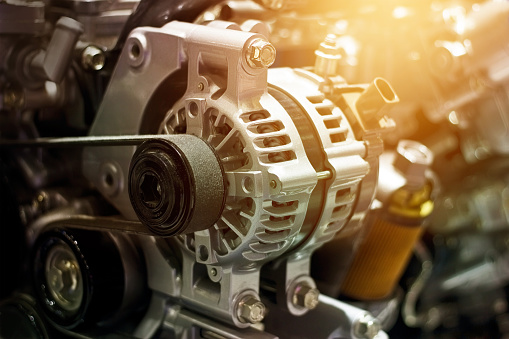Alternators are robust pieces of machinery, often lasting anywhere between 6 to 8 years on average. Their lifespan is usually measured in mileage, with a well-maintained alternator running smoothly for about 80,000 to 150,000 miles. This isn’t a hard and fast rule though; factors like the type of vehicle, its mileage, and how it’s driven can influence this range.
One of the principal culprits that can shorten an alternator’s life is heat. The engine’s heat, especially in vehicles that frequently tackle challenging terrains or are driven hard, can accelerate the wear and tear on the alternator, reducing its lifespan.

Understanding the Alternator: Its Function and Importance
Your vehicle’s alternator isn’t just another component; it’s the lifeblood of its electrical system. It serves a dual purpose. First, it keeps your battery charged, ensuring you’re not left stranded with a dead battery. Second, it powers various electrical systems in your vehicle, from headlights to advanced navigation systems.
The engine’s crankshaft sets a serpentine belt in motion, which, in turn, rotates the alternator’s pulley. This movement inside the alternator generates alternating current (AC) voltage, a feat achieved through electromagnetic induction.
However vehicles work on direct current (DC), so the AC voltage from the alternator is converted into DC via diodes. This regulated DC voltage then keeps the battery juiced up and powers other electrical components.
Why Alternators Are So Durable
The modern-day alternator is a marvel of engineering. Unlike the older generators that produce direct current (DC), the alternator produces alternating current (AC). This AC is then converted into the DC that vehicles use. The shift to alternators was largely because they are more efficient and can handle modern cars’ increased electrical demands.
Cars today are sophisticated, and the demand for the alternator is exponentially higher than it was a few decades ago. Think about it: advanced infotainment systems, GPS, powered windows, adaptive lights, heated seats, and so much more. All these systems draw power, and the alternator has to keep up. This continuous work can, over time, wear out the alternator, but its robust design ensures it serves you for years before that happens.
Factors That Affect an Alternator’s Longevity
While alternators are durable, several factors can influence their lifespan. For instance, oil leaks near the alternator can cause damage. Also, installing low-quality aftermarket electrical accessories might strain and overload the alternator. Even something as simple as a belt that’s too tight can cause undue stress on the alternator’s bearings, leading to premature wear.
Symptoms of a Failing Alternator
Understanding the signs of an ailing alternator can save you from potential headaches down the road. If your headlights begin to dim or your engine struggles to start, these could be indicators. Additionally, a peculiar burning smell might suggest the alternator’s diodes are overheating.
Modern vehicles also have warning lights that illuminate when the charging system is not functioning optimally. If these lights come on, it’s crucial to seek a professional’s advice.
Replacing Your Alternator
If you’re mechanically inclined, replacing an alternator can be a DIY project, but it’s not for the faint-hearted. It involves disconnecting the battery, removing the belt from the alternator pulley, unfastening the alternator, and then reversing the process with the new one. But, if you’re unsure, it’s always best to consult with a professional.
Typically, the process can take a professional about an hour or so, but this varies depending on the vehicle’s make and model.
Cost Implications
The cost of replacing an alternator varies widely based on your vehicle’s specifics and whether you opt for a new or remanufactured alternator. On average, for most domestic cars, you might find yourself spending between $300 and $500, including labor. For imported models or luxury vehicles, this cost can go up.
In Conclusion
The alternator is a critical component of your vehicle, and understanding its function, longevity, and the signs of its failing can go a long way in ensuring smooth rides and fewer visits to the mechanic. Regular maintenance and being attentive to your vehicle’s needs will ensure that the alternator serves you for the longer end of its expected lifespan.

Editorial Staff
Our writers, editors, content managers, and SEO specialist. We all take part in crafting amazing articles. We spend hours ensuring that each article is based on facts, researched, and thorough. You'll never want to click the back button to look for more answers other than here!
